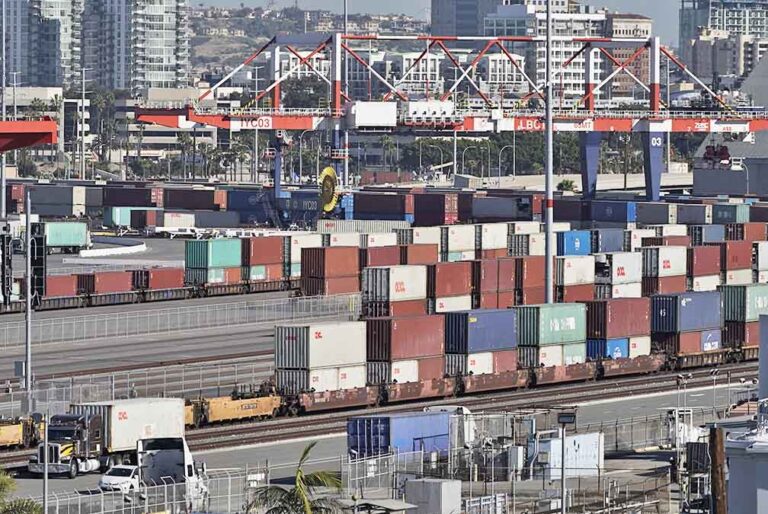LONG BEACH, Calif. — Southern California’s vital Port of Long Beach is still dealing with a backlog of waiting cargo vessels, its top official said Wednesday in renewing calls for transforming the supply chain into a 24-hour, seven-days-a-week operation.
In an annual state-of-the-port address, Executive Director Mario Cordero also outlined infrastructure and technology plans for improving movement of goods but said the issue goes beyond operation of the port.
About 40% of the container cargo entering the U.S. comes through the Port of Long Beach and the adjacent Port of Los Angeles, and both moved record volume last year. In October, President Joe Biden announced a plan for around-the-clock operations, but it hasn’t happened.
“There are 168 hours in a week and for the most part, our terminals are open less than half of those hours,” Cordero said in a video presentation. “Without expanding our terminals or building new facilities we could still handle more cargo by utilizing more of those hours. We’d also need truckers and warehouses to go 24/7.”
Cordero said the Biden administration helped to establish the “framework” for 24/7 supply chain operations.
“In Asia, on the other side of the Pacific Ocean, our trading partners are already operating 24/7. We need to make it our goal as well. It has to be our next great transformation,” Cordero said.
Looking ahead, Cordero said the omicron variant continues to bring uncertainty about the economy.
“Here at the port of Long Beach we continue to work to clear backlogs of vessels offshore which assures that we’ll remain moderately busy into the spring. Still, given our historic volumes in the first half of 2021 we’ll be hard pressed to see more than slow gains until perhaps the fall,” he said.
Among initiatives, the port is working to maximize on-dock rail to accelerate cargo destined for Utah, Nevada, New Mexico and Arizona. That would free up equipment to support the Southern California market.
The port has also joined with a technology firm to create a “supply chain information highway,” a tool debuting this month that will allow cargo to be tracked across various modes of transportation.
“All of this will help,” he said. “Still, we need to recognize that the supply chain isn’t so elastic that it can easily handle historic jumps in volume.”
The Associated Press is an independent global news organization dedicated to factual reporting. Founded in 1846, AP today remains the most trusted source of fast, accurate, unbiased news in all formats and the essential provider of the technology and services vital to the news business. The Trucker Media Group is subscriber of The Associated Press has been granted the license to use this content on TheTrucker.com and The Trucker newspaper in accordance with its Content License Agreement with The Associated Press.






